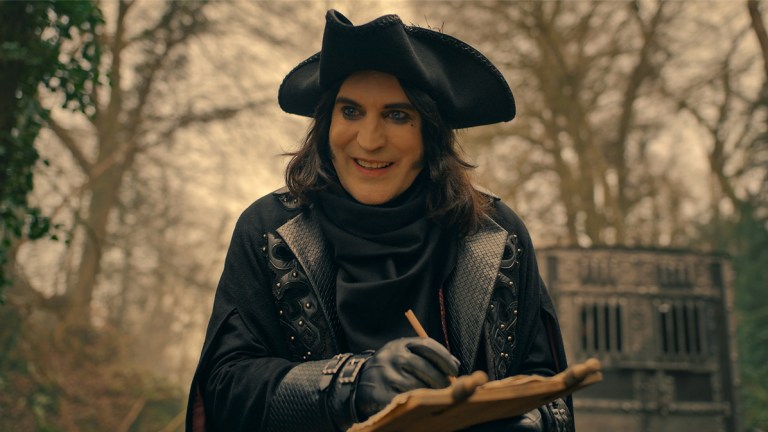Why Historical TV is Chucking Away the History Books
Is accuracy ever the point?

Audiences love a bit of history. Kings, Queens, dates, battles, all of that stuff. And a big part of the fun in watching a historical drama is knowing that you are watching a version of events that have actually happened. Yes, there might not be any material evidence that J. Robert Oppenheimer’s wife was imagining him having sex with his mistress during his private security hearing, but enough of the other details are right that we don’t know for certain she didn’t.
We like learning about the small personal dramas behind the big events, and seeing how people lived and loved and worked in an age before laptops and phones. Audiences want to connect with something real. And if those historical dramas don’t get all of the details exactly right, then that’s fine too! Some people get annoyed at Neil DeGrasse Tyson-style pedantry, but it can be fun and illuminating to learn about the little anachronisms that slip through the cracks, or the modern assumptions that simply wouldn’t have held water decades or centuries ago.
But when you go looking for those inaccuracies it is often worth pausing for a moment to ask – is accuracy even the point? When you’re watching Robin Hood (2018) and the Sheriff of Nottingham has just ordered his riot police onto the street, is it worth considering that this movie isn’t really supposed to be about the enforcement of feudal hierarchy during the Crusades?
TV period dramas and comedies have begun to embrace an approach that doesn’t just allow historical inaccuracies to slip through the net, but actively embraces them, and even casually chucking the whole history book out of the window if it gets in the way of a good story.
The Rise of the “Anti-Historical”
Historical retellings that have played fast and loose with history are nothing new (see: Shakespeare), and gleefully inaccurate comedies are also well represented among the classics – Monty Python, Blackadder, ‘Allo ‘Allo, for a small sample.
But over the last couple of decades historical comedy-dramas not quite as all-out hilarious as Edmund and Baldrick’s adventures have begun owning the fact.
Desperate Romantics (2009), which did excellent work in the service of making Aidan Turner look bedraggled in a big puffy shirt, opened with the disclaimer “In the mid-19th century, a group of young men challenged the art establishment of the day. The Pre-Raphaelite Brotherhood were inspired by the real world about them, yet took imaginative licence in their art. This story, based on their lives and loves, follows in that inventive spirit.”
And it did that, although while events were compressed for pace, and plenty of fictional material was added, it benefited from the outrageous nature of the source material. The series’ grave-digging finale, for instance, was not invented.
Not long before that, Russell T Davies’ David Tennant-starring Casanova biopic verged on fourth-wall breaking, with characters complimenting Casanova on his French as he spoke in the broad estuary English that would become the Tenth Doctor’s trademark.
Skipping forward a couple of decades, the marketing for Hulu’s The Great included social media polls asking who would win in the battle for Russia’s throne, which might seem like an artificial source of tension given we could all look up the answer on Wikipedia.
But as The Great’s on-screen title advertised it as “An Occasionally True Story”, updated to “An Almost Entirely Untrue Story” for its second season finale, that conclusion was in doubt.
As was the outcome of the recently cancelled Our Flag Means Death, which neatly sidestepped the facts that Black Beard and Stede Bonnett were only both operating at sea for a year before their deaths, likely never met, and also that Stede was a straight-up owner of enslaved people.
Of all the loudly anti-historical shows out there, however, it’s harder to find a more obvious middle finger up at established historical fact than Apple TV+ title The Completely Made-Up Adventures of Dick Turpin.
With inventions like The Unrobbable Coach, and Dick Turpin trying to deceive a stagecoach by claiming to be a time traveller from the future, it is so egregiously inaccurate that it works as a fantastic case study for asking what historical accuracy is even for.
The Past is Another Country (Like Middle Earth)
The Completely Made-Up Adventures of Dick Turpin is clearly not a show made by people who don’t know the history. They’re just more interested in telling a fun story. One of Dick Turpin’s writers previously worked on The Crown, a show built on taking huge piles of historical research and fudging the facts into entertaining television.
This Dick Turpin does not occupy Hempstead as it existed in 1735. He rides through a secondary fantasy world, a magical Highwaymanland, that just so happens to be called Hempstead and shares some things in common with the historical setting. Dick Turpin was the son of a butcher. Jonathan Wild was a man who set himself up as “Thief-Taker General” as a cover for his own crimes.
It all makes the perfect setting for a comedy about a stagecoach robbing gang, and it gives the creators room to manoeuvre. Some of those are small freedoms, like the ability to write in a contemporary register, which not only makes for more relatable dialogue but also is just plain funnier when it’s being said by people in tricorn hats. Some have a bigger impact – for instance, the inhabitants of Highwaymanland are not bound to obey 18th century social attitudes around gender and ethnicity, for instance.
Perhaps that is the way to view these shows, less as attempts at history, and more like a subgenre of fantasy (and remember that works like The Princess Bride and even The Hobbit ostensibly took place in our own history before secondary worlds were in vogue).
Given that next week Dick Turpin will have to share the highways with Renegade Nell in new Disney+ supernatural 1705-set highwaywoman drama, it looks like this trend from imaginative historical to fantasy is going nowhere.
The Completely Made-Up Adventures of Dick Turpin streams weekly on Fridays on Apple TV+
